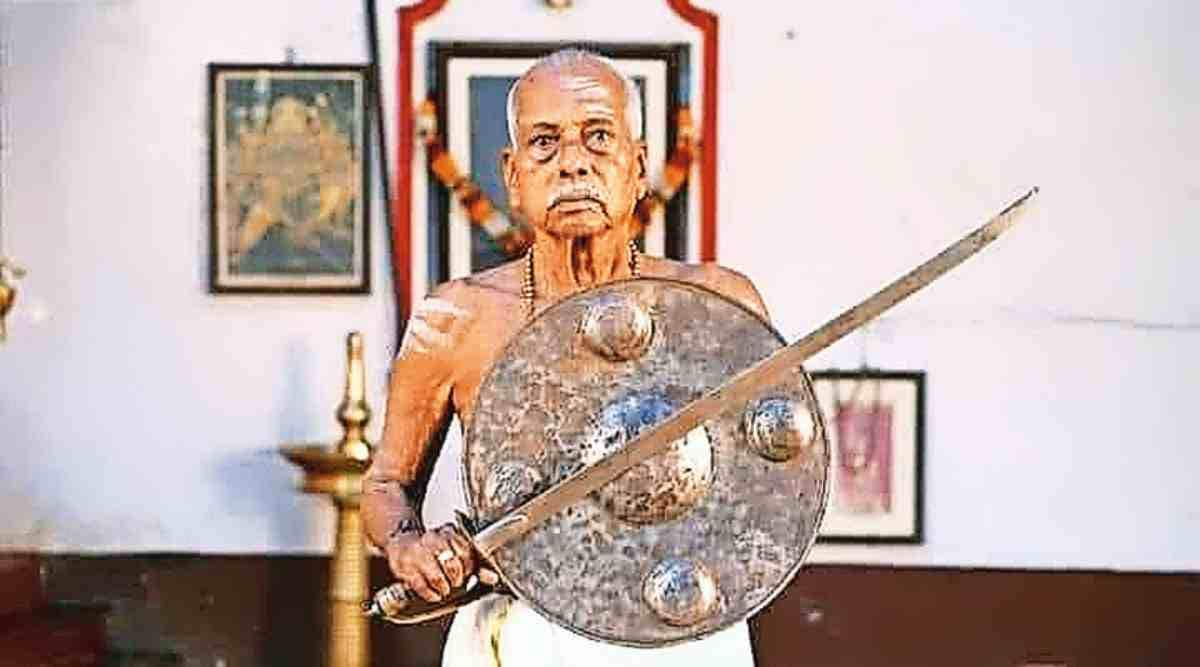 Sankaranarayana Menon
Sankaranarayana Menon REPUBLIC DAY began like all other mornings for Sankaranarayana Menon, the 93-year-old kalaripayattu exponent who has been conferred the Padma Shri for his contributions to martial arts. As has been the routine for as long as he could remember, he woke up at 5 am, bathed in the family pond, offered prayers at the courtyard temple and stepped onto the kalari (arena) in Kerala’s Chavakkad where his students waited for him, ready for three hours of gruelling training of body and mind.
There was a brief round of applause for his achievement, announced by the Government on Tuesday night, but no excess celebration. “I am obviously glad that the Government has recognised me. But it’s not the end. I will continue teaching students as long as I am alive. It’s my duty,” he says, in a soft but clear voice.
These days, his body can’t take the rigours of demonstrating the intricate steps (“adavu”) on a daily basis. So he restricts himself to reciting instructions in a metrical, singsong slang, almost like folk poetry, passed onto him by his forefathers.
Yet, Menon says he can still perform most steps “without breaking a bone or pulling a muscle”. The movements are no longer muscle memory, but memory itself. “I have been practising those moves since I was seven, so it has become a part of me, like my mind. I feel I need to finetune some of the steps,” he says.
In the best traditions of kalaripayattu, Menon has a taut and supple frame. Says his son Krishnadas: “We don’t look to build big muscles like pehelwans, but rather compact muscles that give us flexibility and make reflexes stronger. My father had a perfect kalaripayattu physique and, in his prime, was known for his dexterous moves.”
Times were different when Menon took baby steps in kalaripayattu in Tirur, now in Malappuram district. His family had commanders in the army of Vettathu Raja, a local chieftain. He was trained to fight, and not teach the combat art form. Those days, kalaripayattu practitioners were prosperous and powerful — even when fighting between the princely states reduced under British rule, they still flourished under royal patronage.
But the disintegration of princely states and the subsequent abolishing of royalty jeopardised their livelihood. Soon, modern martial art forms such as karate and kung-fu started becoming popular in the state, and kalaripayattu lost its reach and resonance. There was romance in the art, but it did not keep the fire burning in the kitchen.
Menon and his family never gave up, though. “My father never thought of quitting. Neither did he dilute his teaching nor make it expensive. Whatever the student could afford, is his guiding principle,” says Krishnadas, who also heads the Kerala Kalaripayattu Association and is the go-to consultant for martial arts, an evergreen genre in the Malayalam film industry.
Upon the invitation of a patron, Menon shifted his base to Chavakkad in Thrissur district in 1957. Today, his school — Vallabhatta Kalari, which follows the Kadathanadan tradition, with emphasis on footwork and body movements rather than armed combat — has 137 students. The centre has also expanded with 17 branches outside the country, including in Brussels and Amsterdam, and twice as many in Kerala. There is interest from Punjab and Haryana, as well.
Krishnadas says the upturn of fortunes began with the tourism boom in the state. “In the mid-1980s, a man came from Belgium I guess, and after years of training under father, went home and opened a centre of his own. And then, more people began to come. As a tradition, we permit only those who have trained under us to open branches anywhere in the world,” he says.
Menon’s sons are seasoned pros themselves, which allowed him to take a break from teaching. But Unni Gurukkal, as Menon is fondly called, insists on teaching himself those who knock on the doors of his kalari. “It’s not in our tradition to send them back. Those who come for knowledge shall get knowledge,” he says.
The ancient martial art form has gone global, lost some of its feudal symbolism and association with bloodshed, and is now recognised as a sport in the country. And the Padma Shri is a recognition of this upward curve. But for Menon, award or not, all mornings will continue to begin in the same way they have for decades.
- The Indian Express website has been rated GREEN for its credibility and trustworthiness by Newsguard, a global service that rates news sources for their journalistic standards.

